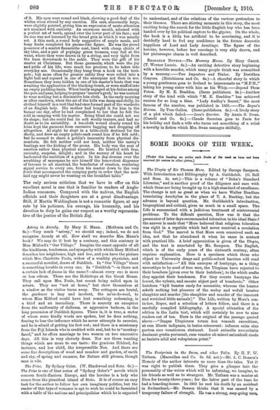Astray in Arcady. By Mary E. Mann. (Methuen and Co.
6s.)—Very much "astray," we should say ; indeed, we do not recognise Arcady at all. How shall we describe Mrs Mann's book ? We may do it best by a contrary, and this contrary is Miss Mitford's "Our Village." Imagine the exact opposite of all the kindliness, tenderness, and sympathy with which Mary Mitford describes her neighbours, high and low, and you have the picture which Mrs. Charlotte Poole, widow of a wealthy physician, and a successful novelist, draws of Dulditch. In "Our Village" there is something lovable in every one. In "Dulditch "—is there not a certain lack of finesse in the name ?—almost every one is moro or less odious. There are the Hobleboys at the Great House. They call upon Mrs. Poole, but resent being called upon in return. They are "not at home," but show themselves at a window as the visitor turns away. The cottagers are brutal, the gardener is lazy and insolent, the ne'er-do-weel, to whom Miss Mitford would have lent something redeeming, is a thief and an incendiary. There is scarcely an exception from the uniformity of dullness, or aggressive badness, in the long procession of Dulditch figures. There is, it is true, a rector of whom some kindly words are spoken, but he does nothing, fearing to lose the influence which he never attempts to exercise, and he is afraid of getting his feet wet; and there is a missionary from the Fiji Islands who is credited with zeal, but he is "monkey- faced," and he offers marriage to two women on two successive days. All this is very cleverly done. Nor aro there wanting things which are more to our taste: the gracious Hildred, for instance, and her child, the irrepressible Nan. And there are some fine descriptions of wood and meadow and garden, of earth and sky, of spring and summer, for Nature still pleases, though man is vile.










































































 Previous page
Previous page